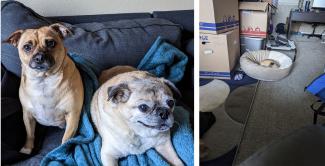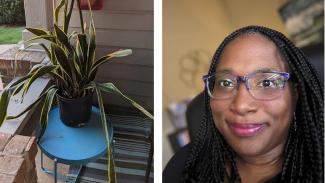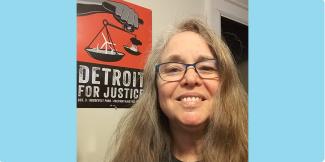By Crystal Zanders, More Life, Less Stuff Freelance Writer
Over the summer, I moved into a smaller apartment. My senior pug had been having difficulty with the stairs in my townhouse. So, I downsized. My new apartment is half the size of the old one, so decluttering was a priority.

You don’t realize how much stuff you have until it is time to pack it all up and move it. Some items were obviously not going to make the move. I loved my 11 ft blue sofa, but it was too big for my new place. Other things weren’t as simple. I don’t grate cheese. But some part of me knows that the minute I get rid of this cheese grater, some cheese will need grating. Guaranteed.
And there are some things that I held an emotional attachment to. I love my plants. They are part of my household, creating oxygen and promoting peace in my home. I didn’t have space for one of my bigger plants. How could I abandon a member of my plant family?
Share Economy

Around this time, I began doing research on the share economy and the Buy Nothing Project. The idea is that instead of putting items in a landfill, you offer those items to your neighbors who may need them. When they need something, they don’t have to shop for new stuff—stuff that carries an environmental cost to produce, distribute and sell. In the share economy, items move from home to home when needed, saving money, reducing waste, and connecting neighborhoods with each other. These communities tend to be hyper-local, encouraging connection and minimizing transportation costs.
So, I decided to try it out. I joined my local Buy Nothing group and began posting photos and descriptions of items I no longer needed. Remember my big blue sofa? I gave it to a college student who was moving into an apartment with several roommates, the perfect place for a big couch. Her family came and picked it up. They were super nice.
I kept the cheese grater, but the plant went to a new home where it joined a new family. I imagine it is happier with more sunshine and space to grow.
Buy No Things Ann Arbor

To learn more about Buy Nothing groups, I interviewed Daniel Grenzicki, moderator of the Ann Arbor Buy No Things group. He explained the basic concept behind Buy Nothing, “Essentially, it's just a community of people, that, share items. It is a way to kind of connect people with each other through stuff.” He told me that one of the biggest benefits of Buy No Things is the sense of community it provides, “It's really easy to just not know your neighbors at all and live here forever. This group gives you another to way get out in your community and connect with people who live near you.”
Daniel Grenzicki explained that the Buy No Things group is not limited to items. “There are all kinds of little things that people want to donate their time and efforts to. They've had clothing swaps. There's somebody doing a sourdough class; people offer free photography stuff. There's a Pullover Prevention group in Ypsi. They do events in the community where they'll help fix your car up, so you don't get pulled over.”
To join a Buy Nothing group or the Ann Arbor Buy No Things Group, Daniel recommends searching for your local group through Facebook, although they can also be found on some other social media platforms. He also encourages people who are interested in participating in a group but don’t have a local group to start their own. He explained, “It’s low effort, high impact. You can connect somebody with something that's just perfect. It's like lock and key sometimes. It's cool the way it works.”
Ultimately, participating in Buy Nothing groups empowers folks to focus less on stuff and more on community, while minimizing their environmental impact. When asked what more life less, stuff means to him, Daniel replied, “ I'm always trying to declutter and minimize the amount of things I have, because you either own your stuff, or it starts owning you. It's very easy to get over encumbered and forget the things that actually bring you joy-- you don't need anything for them.”
Buy Nothing Year

After my move, I committed that I would spend the next year making a conscious effort not to accumulate as much stuff. I don’t want to purchase things that I don’t need or hold on to things I don’t use. For inspiration, I spoke with Dr. Kathryn Savoie, Director of Equity and Environmental Justice at The Ecology Center, to learn about her journey undertaking a 'Buy Nothing' year.
Although I had seen folks talk about taking a 'Buy Nothing' year on social media, it means different things to different people. Dr. Savoie explained how she tailored the idea to her life, “I'm not an absolutist about it. To me, it's a way of being more intentional. It makes me stop and really think 'do I need this?' So, there are exceptions. I bought socks and underwear. I buy food, toilet paper, and things for the household. But do I need a new set of sheets right now? No, I probably don't.” She told me that the biggest challenge was mental, “Most of the adjustment has been a change in my attitude towards things. I'm not spending money on things that I don't need. I'm not cluttering up my house with things. And I have more time to do the things I enjoy.”
One of the things that I was most curious about was gifts. I love to buy Christmas presents for my niece and nephew who are young enough to see Christmas as magical, to listen for reindeer on the rooftop. Would doing a 'Buy Nothing' year mean that I couldn’t buy them gifts? According to Dr. Savoie, canceling Christmas, as far as gifts are concerned, is not necessary. For her the goal of a 'Buy Nothing' year is to slow down and think before making purchases. She explained, “I do gifts. I am just more thoughtful about what kind of gifts I give people so that I'm not adding to their clutter. I've been much more intentional about buying gifts that are experiences: a gift card for a massage or tickets to a movie, show, play or concert. Sometimes I make canned fruit from my garden and give people homemade jam.”
When asked about what more life, less stuff means to her, Dr. Savoie gave this sincere response, “I think it just means that we try to focus on what's important in life and enjoy this beautiful planet, the people that we love, and the things we love and without getting caught up in all the stuff.” Ultimately, Dr. Savoie explained, “We can live with so much less and be so much better off.”
I felt inspired by the words of Daniel and Dr. Savoie. It is important to prioritize each other and our experiences and be mindful of the constant pressure to consume. At the end of the day, more life is about connection. Limiting the things that we buy allows us the space to connect to ourselves. Participating in the share economy encourages us to connect with our neighbors.
So, I am encouraging members of this community to join me in participating in the 90 Day No New Clothes Challenge. To do that, I will agree not to purchase any new clothing items for three months. Because I can’t shop at thrift stores, that means I will be committing to wearing past year’s winter clothes. I looked pretty fabulous the last few winters; that shouldn’t be much of a sacrifice.
